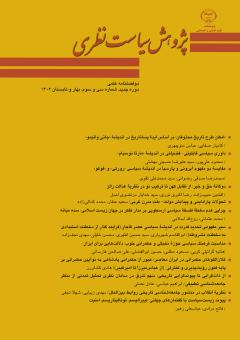سیر مفهومی تحدید قدرت در اندیشۀ سیاسی عصر قاجار (فرایند گذار از سلطنت استبدادی به سلطنت مشروطه)
محورهای موضوعی : Research in Theoritical Politics
ابوالقاسم شهریاری
1
,
سید حسین اطهری
2
![]() ,
محسن خلیلی
3
,
مهدی نجفزاده
4
,
محسن خلیلی
3
,
مهدی نجفزاده
4
![]()
1 - دانشجوی دکتری علوم سیاسی، دانشگاه فردوسی مشهد
2 - دانشیار گروه علوم سیاسی، دانشگاه فردوسی مشهد
3 - استاد گروه علوم سیاسی، دانشگاه فردوسی مشهد
4 - دانشیار گروه علوم سیاسی، دانشگاه فردوسی مشهد
کلید واژه: تحدید قدرت, قاجاریه, سلطنت مشروطه, سلطنت استبدادی و اسکینر. ,
چکیده مقاله :
بررسی تاریخ اندیشۀ سیاسی تحدید قدرت در عصر قاجار که به سلطنت مشروطه منتهی گردید، هدف پژوهش حاضر بوده و این سؤال مطرح شده که مفهوم سلطنت مشروطه به عنوان جلوه نهایی تحدید قدرت در عصر قاجار، چه فرایندی را طی نموده است. برنامه پژوهشی اسکینر به عنوان مبانی پژوهش انتخاب شده که معتقد به سیر تاریخی اندیشه بوده، آن را از طریق میثاقهای زبانی قابل شناسایی میداند. نتیجه بررسی نشان می¬دهد که سلطنت مشروطه، نتیجۀ توسعۀ سه میثاق زبانی در تحدید قدرت است: تحدید قدرت ابتدا در سلطنت فتحعلیشاه با عنوان پادشاه مسلوبالاختیار به ساحت اندیشۀ سیاسی ایران وارد شده و پس از آن در عصر ناصری با دو میثاق سلطنت مطلقه منظمه و سلطنت معتدله توسعه یافته است. سیر نهایی اندیشه تحدید قدرت در عصر مظفری بوده که استمرار سلطنت استبدادی به شرایط بسیار نامساعد ایران منجر گردیده و راه گذار از آن با عنوان سلطنت مشروطه مورد توجه قرار گرفته است. در نظر اسکینر، تمامی فرایندهای طی¬شده برای تحدید قدرت در عصر قاجار، اقدامات اصلاحی به منظور مشروعیتزایی برای نظام سیاسی محسوب میگردد.
Investigating the history of the political thought of power limitation in the Qajar era, which led to the constitutional monarchy, is the aim of the present study, and the question has been raised that what process the concept of constitutional monarchy goes through as the final manifestation of the power limitation in the Qajar era. Skinner's research program was selected as the basis of the research, which believes in the historical course of thought, and considers it identifiable through linguistic conventions. The result of the study shows that the constitutional monarchy is the result of the development of three linguistic covenants in the limitation of power: the limitation of power first entered the field of Iranian political thought during the reign of Feth Ali Shah as the limited king, and then in the Nasrid era with two covenants of absolute monarchy. And moderate monarchy developed. The final course of the idea of power limitation was in the era of Mozaffari, when the continuation of the autocratic monarchy led to very unfavorable conditions in Iran and the transition from it was considered a constitutional monarchy. In Skinner's opinion, all the processes used to limit power in the Qajar era are corrective measures to legitimize the political system.
